This little girl is the only one of my ancestors, back to 1800, not born in south Ulster.
It brings to mind another little girl, her great-grandmother, who was born in India about 1794 and married 11 years later.
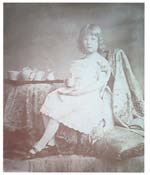
McWilliam of Monaghan
McWilliam genealogy
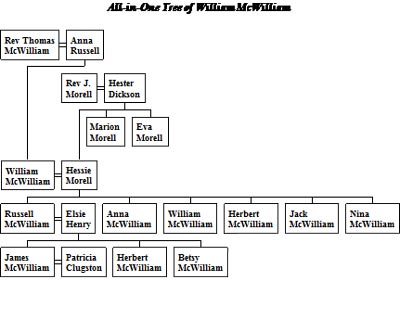
My own direct knowledge of the family story really starts with the arrival of William McWilliam in Monaghan to start his solicitor’s practice in 1874. He was born in Creggan, south Armagh in 1850 the second youngest son of Rev Thomas McWilliams and Anna Russell. I myself grew up in Monaghan and so I know the houses where he lived, the courthouse where he worked, the church where he worshiped and the streets he walked. His first house was in Swan Park, the same house where my father had his office. Just across the road was the Model school where my grandfather and his brothers received their first schooling as I did 70 years later. Like them and my father I was sent off to boarding school.
There are numerous pictures of Monaghan at the turn of the 20th century. A picture of the Diamond makes me wonder was my great grandfather just round the corner; could those well dressed boys on the pavement have been my grandfather and a brother and the small girl a sister; were his wife and sister-in-law window-shopping. Probably not but . . .
There is a picture of the opening of the county hospital on the Hill in 1895. I have to assume that the newly appointed Clerk of the Crown and Peace was amongst the assembled dignitaries; I just can’t identify him.
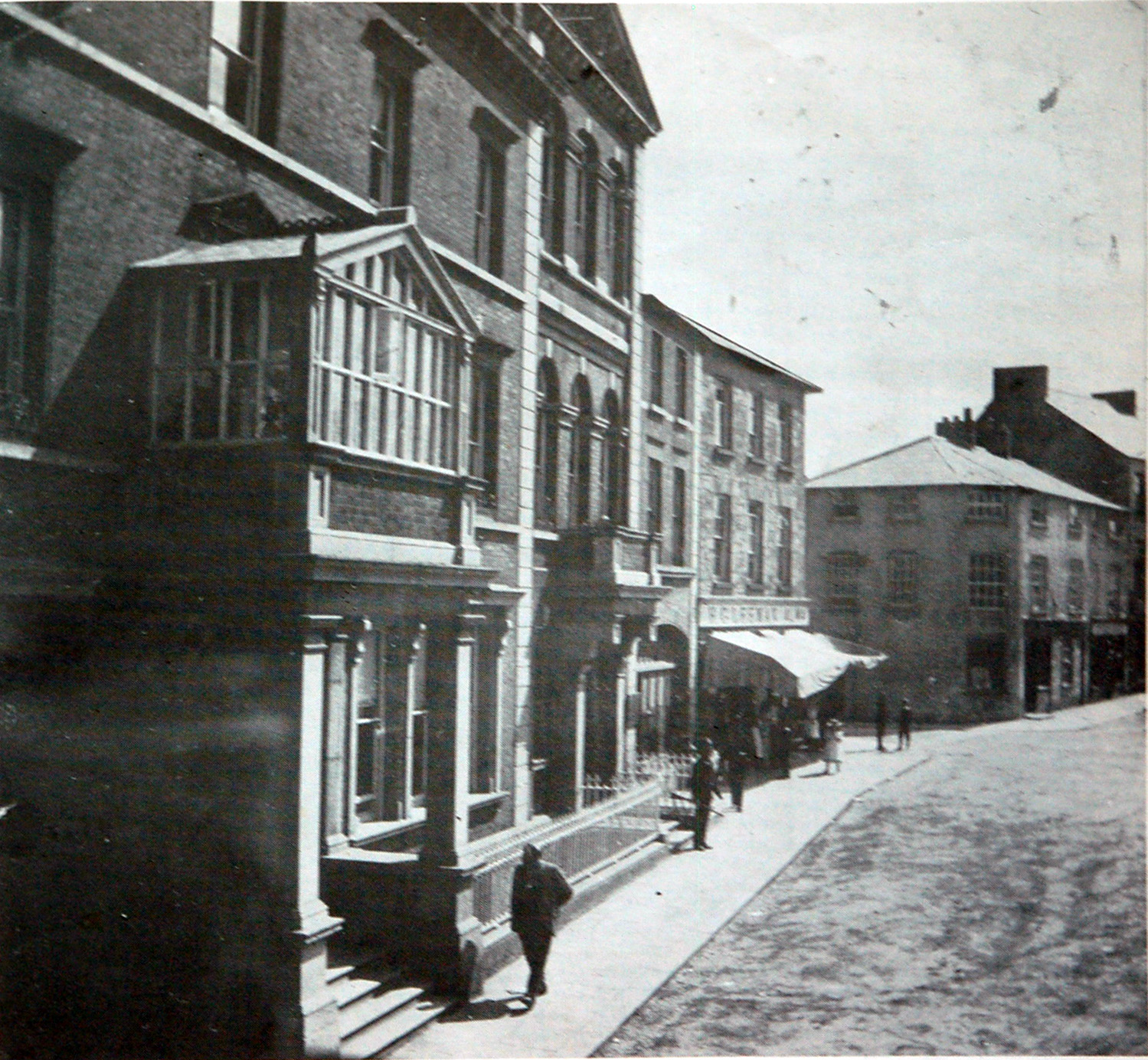
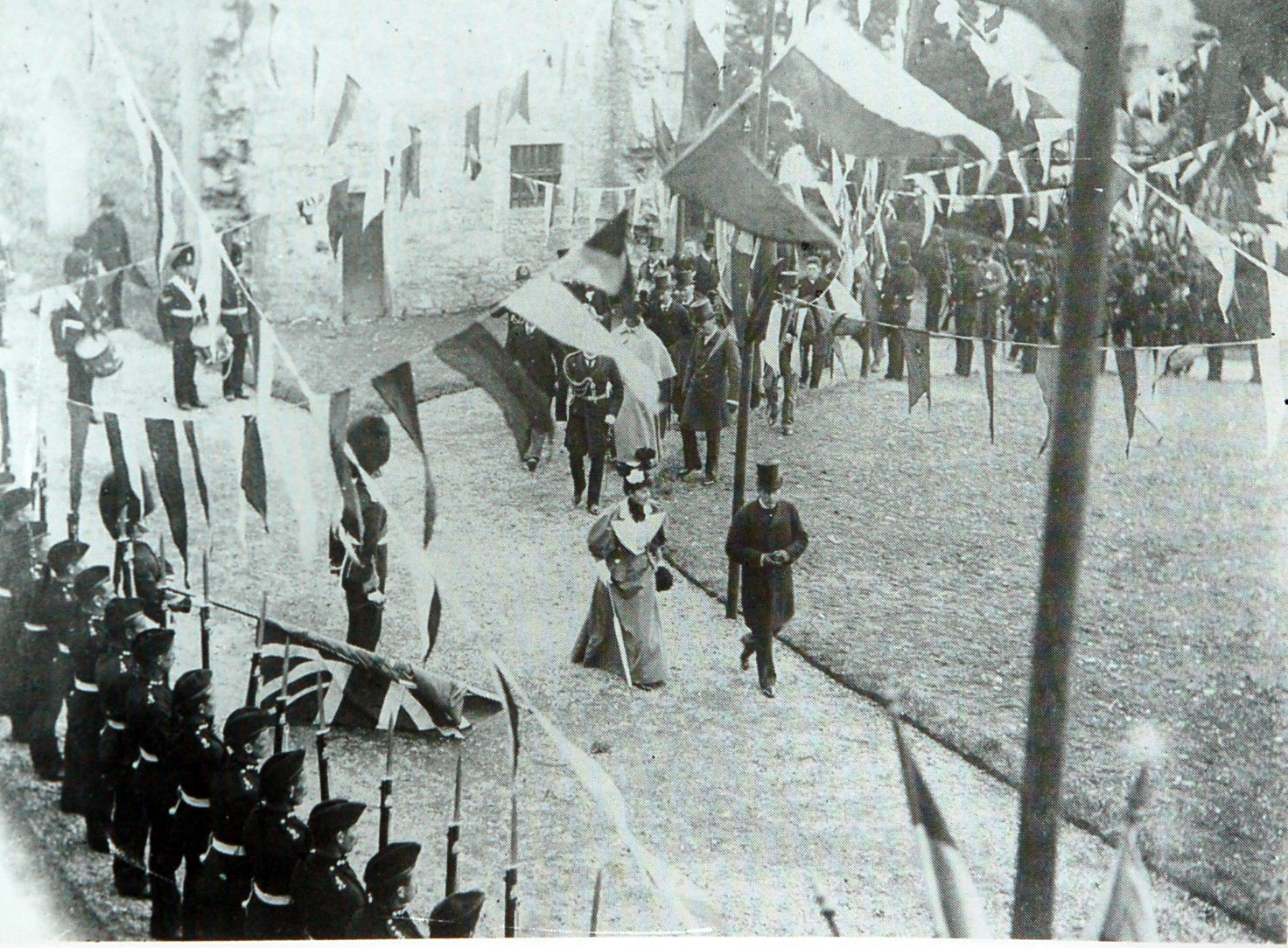
As far as I can tell in the absence of direct records 2 of my great grandfathers, James Henry and William McWilliam were apprenticed as solicitors to Joseph Dickey in Dundalk. Certainly soon after both qualified in the mid-1870s, Thoms Directory has Joseph Dickey, Thomas Dickey, James Henry & William McWilliam using the same Sackville St address as their Dublin office.
Joseph Dickey was educated in John Bleckley's classical school at Corlatt, Monaghan contemporaneously with John Reilly, brother of the Young Irelander, Thomas Devin Reilly.
Dickey was election agent for the Conservative party in Co Louth, a role filled by Reilly in Co Monaghan.
This leads me to suspect that John Reilly sponsored William's start as a solicitor in Monaghan. Certainly both men were elected to the Board of Guardians in Monaghan in 1879 with an identical list of assentors. When Reilly retired as Election agent in 1880 his place was filled by George Knight and William McWilliam.
I like this possible connection since Holly Lodge, the house I grew up in was occupied by John Reilly (& previously by his father, Thomas) throughout a large part of the 19th century.
William McWilliam was an enthusiastic photographer - a series of glass slides of his work are now in the Monaghan County Museum. I have to wonder whether he was encouraged in this hobby by Reilly who is reputed to have introduced the practice to Monaghan according to Rushe. The photo of Corlatt further down this piece is from that collection.
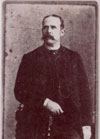
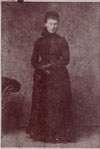
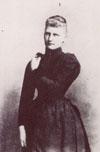
I came across a newspaper report of a Law Society debate William took part in as a student. He spoke against a motion in favour of early marriage. He may have convinced his hearers but obviously failed to convince himself because in 1877 he married Hessie, the daughter of Rev John Harris Morell, Presbyterian minister of Ballybay. John Morell’s first wife was a sister of William’s mother so the bride’s half-brother was his first cousin. The couple had six children, Russell (my grandfather), Anna, William, Herbert, John and Nina before Hessie died of TB in 1887 aged 32.
The care of William’s young family was taken over by Hessie’s elder sister, Marion. In 1907, on the passing of the Deceased Sister’s Marriage Act in 1907 he married her. The two sisters are buried with him in Coolshannagh Graveyard in Monaghan.
Newspaper Extracts (1881-1957)
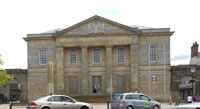
Since legal and political matters were extensively reported in the local newspapers, the Northern Standard (& for a period the Peoples’ Advocate) it is straightforward to build up a picture of their public lives which centred round the courthouse. Having two newspapers covering the same events is a great advantage since the two had diametrically opposed political perspectives.
Fuller extracts from the two newspapers
People’s Advocate; Sat July 23rd, 1881.
Case arising out of a disturbance during an Orange march from Dublin Street to the Shambles on 30th June.
The cases were Constable McDonald vs. Charles L Houston, Sub-Constable Torley vs. Thomas Moorehead & Constable McLoughlin vs. Wm J Gillanders.
The cases against the Protestants (all for assault with fists against persons unknown) were dismissed.
One Roman Catholic was returned for trial, for stone throwing, and then bound over to keep the peace.
William McWilliam appearing for the Orangemen wanted the matter dismissed as party feeling had subsided
Northern Standard; Sat, June 23rd 1883
By-election caused by the resignation of John Givan MP in 1883
Great Conservative demonstration
McWilliam – as a Presbyterian – Resolution to express regret that Liberals were standing & splitting Prot vote
He was the son of a Presbyterian clergyman & his brothers were Presbyterian clergymen
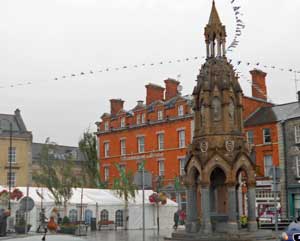
Northern Standard; Sat, June, 30th 1883
Mr Monroe’s agents
Geo Knight, solr for 30 years, respected and liked
Mr McWilliam of Monaghan works enthusiastically. His pleasant and good humoured face is seen everywhere, and his amusing stories send the loud laughter round his comrades in arms, after a hard days work and a good dinner in the Westenra Arms.
Mr Pringle’s chief supporter is Mr Dickson, MP. His conducting officer, Mr Ross, can be dismissed in a sentence. His great forte is to quote irrelevant poetry – fussy, violently partisan – not overburdened with brains.
The People’s Advocate had a different slant on the proceedings
On the conservative side Mr Geo Knight, Sir Samuel Wilson, Col Lloyd, John Munroe, Hugh Holmes & Sir John Leslie were all enumerated (as candidates).
It was also said the Tories would run a working man candidate & it was confidently stated Mr McWilliam, solr. had been commissioned to bring forward this child of toil from the Dublin workshop where he was wasting his Parliamentary fragrance.
Poll; Healy, 2,276 – Monroe, 2,011 – Pringle, 270
Northern Standard; 14th April 1886
Meeting of Board of Guardians,
Owen McNally in chair: Present were Wm Elliot, RT Blakely, JP, Robt Lyons, Robt Wilson, John Treanor, Peter Duffy, Peter Tierney & Ed Duffy.
Irish Government Bill.
They dealt with some business and then Wilson left and the Nationalists were in the majority and in the chair.
Treanor proposed the following resolution, eulogistic of Gladstone and his scheme for the government of Ireland.
That we, the members of Monaghan Board of Guardians - - - take this opportunity in placing on record our sincere and heartfelt gratitude to the Rt Hon Wm Ewart Gladstone PM for his statesmanlike effort in bringing before the people a measure which has as its object the legislative independence of Ireland.
Mr Elliot and others objected – keep politics out of Guardians
Northern Standard; May 8, 1886
Meeting of Board of Guardians.
32 members were present with Col Lloyd in chair
There was a motion to rescind a previous motion in support of the Home Rule Bill.
When the motion was proposed by Wm Elliott, JB Ross objected and wanted other business taken first according to the rules in Banks.
Mr Elliott - I am glad there is some reformation wrought in you, for when this resolution was passed it was introduced before any other business
McW moved that the business be taken in order.
Clerk - It doesn't matter as the Guardians were summoned for both purposes.
Some rude words exchanged
McW - just vote on motion - not discuss politics.
Mr Ross - Gladstone best ever
[Elliott - change of heart in two years.]
Brings in Wilberforce and slaves & Peel and Wellington coming down to the House and stating that Catholic Emancipation must be granted to the Irish. Property and Liberty not inseparable. Grattan brought in.
Elliott interrupts.
McW requests that he would not do so again as the speech was already in print and must be delivered.
Mr Ross - I do not know if my friend intends that as an insult.
McW - I would say you are insulting us.
Mr Ross - Catholic people had never exercised tyranny and oppression & goes back to the days of Alfred to prove his assertion.
Mr Tierney - If we got the management of our own affairs in a native parliament it would put an end forever to sectarian quarrelling.
McW - That was said twice by Mr Ross.
Mr Rafferty wants to say one word. We would rather see the country immersed in the bottom of the sea than see tyranny practiced by the Catholic populace.
McW - Vote. We have had two full speeches on each side. The motion was carried by 28 votes to 8.
A second motion was proposed by McCullagh (U) to leave politics out of the business. It was 2nded by McW - Ross didn't assent.
People’s Advocate
Ross’s speech was indeed reported but McWilliam’s quips were omitted; in NS insults thrown by Mr Elliot re. Price of pigs were not mentioned.
Main point in speech; Ulster Protestants opposed every measure of reform;
Catholic Emancipation was granted; the church was disestablished and yet forebodings never came to pass.
Ross’s remarks were frequently interrupted.
Home Rule
William McWilliam was clearly against both the Home Rule Bills (1886 & 1893). Parallel entries from the two rivals newspapers suffice:
Northern Standard
1893, Sept 27th - Meeting of the Monaghan Womans Unionist Association in the Town Hall, adjoining the Westenra Arms.
Lady Constance Leslie in the chair.
The attendance incl the Misses Morell (sisters-in-law of William McWilliam)
The 46th Psalm, 'God is our refuge and our strength', was sung.
"The work which we undertook six months ago has been successful beyond our utmost expectations. All they wanted was justice, and they wanted England to understand that. They did not wish to tyrannise over their adversaries, but they would not be allowed to tyrannise over them."
People’s Advocate
1893, Sept 29th
“What a delightful life must be that of a lady Unionist”.
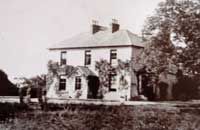
Northern Standard Sat Sept 7th 1895
The Clerkship of the Crown - The official confirmation of Mr McWilliam's appointment to the above office in this county, rendered vacant by the death of the late Mr Robert Murdock, was received by him and the Secretary of the Grand Jury on Wednesday last.
From Rev JM McWilliam: When my father was appointed Clerk of the Crown and Peace for Co. Monaghan it was possible for him to live out of town as there was no pressure of work. Several vacant houses were inspected and considered. My aunt at one stage raised the question of renting Castleshane, a house with thirty or forty rooms which was then unoccupied. Her chief reason was that her great-grandmother, Fanny Lucas, had been born there. This plan was abandoned. Finally the choice was made of Corlatt, a small country house of four stories, with seven rooms and kitchens and attics, very narrow from back to front.
Circular 1st Feb, 1901
Sir,
I am directed by the Rt. Hon. Lord Rossmore, Lieutenant of the county, to call a meeting of the Justices of the county of Monaghan, to be held in the Courthouse, Monaghan on Tuesday 1st day Feb, inst., at 1.30 o'clock pm for the purpose of passing a resolution of sympathy with His Majesty in consequence of the loss occasioned to His Majesty and the Nation by the death of Her late Majesty, Queen Victoria.
Yr Ob Ser, Wm McW, Clerk of the Crown & Peace.
3rd Home Rule crisis and aftermath
Notes for biographies of Herbert & William, jun, McWilliam, sons of William & brothers of my grandfather, Russell
28 Sept 1912 Solemn League and Covenant signed in Ulster.
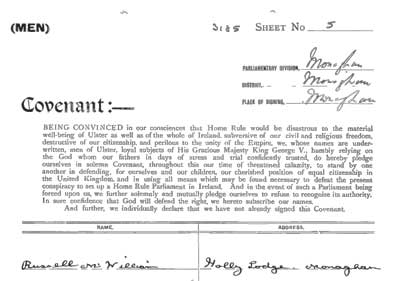
In 2nd Ballybay Presbyterian church my grandfather's uncle, Rev. James Morell preached a sermon for the occasion. A full report of this sermon was published in the next issue of the Northern Standard.
His text was from the beginning of the twenty third psalm:
The Lord is my light and my salvation, whom shall I fear.
The Lord is my strength and my life, of whom shall I be afraid
Though an host shall encamp against me, my heart shall not fear.
Though men should rise against me, in this will I be confident.
He warned his congregation of the hard struggle to come and gave them three reasons for confidence. In his first reason he alludes to the special character of the Ulster-Scots, 'a Scotsman greatly improved by long residence in Ireland', who have made Ulster the garden of Ireland by their industry. He quotes Lord Rosebury as saying that the 'Ulster-Scots are without exception the most dominant, the most irresistible race that exists in the Universe'. Secondly he points out that the Unionists are supported
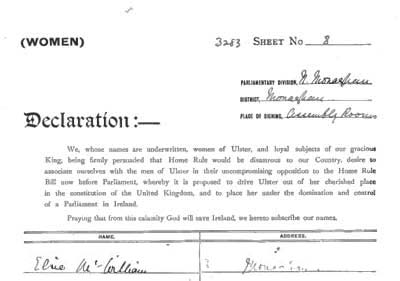
by the Unionist family in England. His third ground for confidence lies in the support that they receive from the Lord. The link implied with the chosen people of the Bible, the Israelites is clear.
The day ended with the singing of God save the King and the signing of the covenant.
NB Ulster Day - 218,206 men & 228,999 women signed the Covenant.
Almost all the relatives I know of, including my 4 grandparents, signed the covenant. The only exceptions I can find were Rev James Morell, who preached the above sermon & my great grandfather, William McWilliam, who may, as a servant of the Crown, have felt it inappropriate to engage in an act of civil disobedience.
Group photo of officers and 3 army men, acting as Instructors to the UVF at Knockballymore House in Jan 1914.
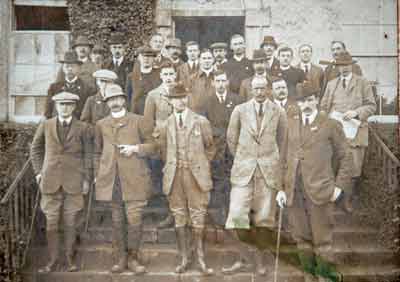
Front (from left) ME Knight, Rev E Stack, Sir John Leslie, Capt R Dawson & Lt Col G Madden.
2nd row Jack Irvine, C King, Capt Davies, Major E Richardson.
3rd row F Rountree, Rev A Davis, B Ritchie, Rev Walter Stack & G Archdall.
Back row ....?, HS Given, GS Rogers, Rev Maurice Stack, ....?, Russell McWilliam, ....?, Rev TC Magee, Fitzjames McKean, ....?, SC Clarke, George Graham.
Family photograph; names from Terence Dooley
In Feb. 1914 at a UVF training camp Dr. Henry of Clones was the medical officer.
In 1914 Russell McWilliam was OC the UVF in Monaghan Town.
Establishment of District Courts
In October 1922 Mr O'Higgins, Minister of Justice in the Dail announced that Stipendiary Magistrates were to be appointed. The county courts were to be continued. There should be an end of prejudice re former 'British Courts'. These courts are now Irish.
This signalled an end to the District and Parish Courts (ie. the Dail or Republican Courts which had been established on 29 June 1920 by Dail Eireann).
In November 1922 27 District Justices sent out
Northern Standard; Nov 10th 1922
Special and first sitting of new Court of Petty Sessions (sic) in Ballybay before Mr MJ Hannon BL
There was a preliminary discussion to get in order Special court
Ballybay child Murder charge - Mary Anne Tate & her mother Eliza were charged with the murder of a child.
Herbert McWilliam appeared for the defendants
He may have been the first solicitor in the county or indeed the state to appear before the newly constituted District Courts. As his daughter Peg McWilliam remarked to me, "My father wasn't prepared to appear in courts that hadn't been legally constituted". This would explain his immediate appearance in the new District Courts.
The same paper carried an announcement of the new courts and the issue of 5th Dec contained 5 notices by William McWilliam, Clerk of the Crown & Peace.
At one stage of the Irish troubles William McWilliam was turned out of his office by the revolutionaries and threatened with death. He came to Scotland and lived with his son, Jack, in Scotland for some time, as Jack put it "in the not very unfortunate position of drawing an income of £1,800 a year while forcibly prevented from doing any work for it".
The establishment of the new District Courts meant that the old Clerk of the Crown & Peace slotted in as Clerk of the Peace in effect retaining his old function.
He retired in 1926 when the newly created post of County Registrar was filled by Henry Murphy
Northern Standard 20 July 1923.
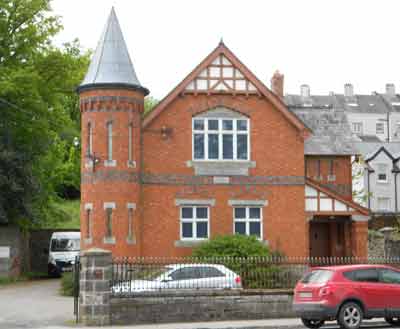
The Orangemen of County Monaghan supplemented by strong contingents from East and West Cavan, met under peaceful and harmonious conditions at Clones on Thursday last to celebrate the 12th July anniversary, just as the Orange Society has done for the past two centuries or more, with but small interruption. There have been prophecies both within and without the ranks of the Orange Society that the setting up of the Free State would see the end of these annual demonstrations, but the meeting at Clones on Thursday was a fitting answer to those forebodings.
Special and ordinary trains brought large contingents from all outlying districts, in Cavan and Monaghan, whilst large numbers came by road. At the railway station a huge procession of about 50 lodges was marshalled into line by various stewards, and a start was made for the place of meeting at Killacoona, about two miles from the town. Passing through the town all business was suspended and a friendly feeling of welcome seemed to possess the spectators who viewed the processionists from the windows and sidewalks. Arriving at the famous beauty spot at Annalore the rendezvous was reached by passing along an avenue of trees whose branches formed much desired shelter from the boiling sun.
The field was placed at the disposal of the brethren by the Very Rev. Dean Haire-Foster and Brother A.Y. Knight, and at the meeting Brother M.E. Knight, County Grand Master of Monaghan, presided.
Brother William Martin, Deputy County Grand Master, moved the following resolution:
"That on this anniversary of the Battle of the Boyne the Orangemen of County Monaghan, as citizens of the Free State, which forms an integral part of the British Empire, reaffirm our adherence to the principles of civil and religious liberty secured by that victory for ourselves and others. We welcome the declared intention of the Free State Government to extend freedom of thought and action to men of all creeds and their expressed desire to recognize the rights of minorities. As representatives of an Institution whose members are pledged to recognize duly constituted authority and who have always been identified with the support of law and order, we trust that the efforts of the Government to suppress crime and lawfulness may meet with speedy success. Standing as we do for the maintenance of Protestantism, we claim due recognition of our rights, to adequate representation on public bodies; and in particular a voice in formulating the educational policy of our native land.
Brother William Martin, in the course of an able and humorous speech, said some people thought that the necessity for such demonstrations in the Free State had passed, but in his opinion, the necessity of holding them was greater than ever. Obviously, remembering the characters of the 'Pilgrim's Progress', he said, many more might have been with them, but for those he might call the 'faint-hearted' and those whom he might call 'Mr. Facing-both-ways'. (Laughter.) Mr. Faint-hearted thought something would happen if they held a meeting in the Free State - although he did not know exactly what that happening might be - but he (the speaker) had got hope for Mr. Faint-hearted. Regarding Mr. Facing-both-ways he did not care so much about him. (Cheers.) If Mr. Facing-both-ways thought it would be popular he would have been there. (Laughter.) Next year he thought these people might have altered their minds.(Cheers.) There were of course some that had been with them in the past that they missed and for whom there would have to be some excuse, some of these people were good, and some middling. (Laughter.) It would be interesting to know why some of these people were not there.
Perhaps their heart failed them; perhaps they wanted to 'wait and see'. (Laughter.) Mr. Knight had been good enough to the Free State to hold this demonstration. I dare say that if that application had been made and granted Mr. Facing-both-ways might have been with them. (Laughter.) Proceeding, the speaker said they all knew that since they had met before the Union which has so long existed had disappeared. The Union they had supported had gone. That portion of the plank might be gone, but the platform was there still. (Cheers.) Protestantism in the past had to be supported and they were coming back to much the same condition of things again. 'Are we faint-hearted' the speaker asked 'are we afraid, (No, no.) They would all agree the speaker went on - that the ancestors suffered more than they had done or were willing to suffer. Some had thought that when the Union was gone that they (the Orangemen) would go too, but that was not so. In Australia, in Canada, in many other parts of the world, and even in the United States, there was to be found the Orange Institution, which stood out for far more that the old opinions, and there were hundreds of thousands in the Colonies who had so much incentive to induce them to remain true to their principles. What they stood for was the maintenance of Protestantism, and they locally asked no more from the Free State Government, than they should be allowed to observe their rights. They have never asked nor did they require any sympathy more than what was given to anyone else, but they claimed the right to law-abiding people to live here. A right that every true citizen was entitled to enjoy so long as he kept within the law. Whether the Constitution of the Free State was to their liking or not, it would be in their own interest to respect the laws. If the Free State Government carried out all the promises that they had made in the past, that was all they asked or required. Those promises provided for free and equal rights for all denominations, that every one could live up to the full measure of his religious belief. Those (the speaker said) were similar to the principles for which they had fought for in the past. They were well aware that the new Free State Government since its foundation, had been very much hampered, and that it was obliged to keep up a very big army, and to spend a lot of money in paying that army. The Free State was in no doubt in an awkward difficulty. They knew too that army was not created to keep their people in bounds, or to pay any attention to them. If every one had been as law-abiding as the Orange Society there would have been no need at all for an army. They only asked to be allowed to observe their rights, they were law-abiding, and if all the other classes of citizens in the Free State had been blessed with principles similar to theirs no money would have to be spent on the upkeep of the army. (Cheers.) They as Orangemen would continue to support law and order, and would give the Free State no trouble, so that the Government would be able, so far as they were concerned to devote their entire attention to the development of the country, and to its welfare as a whole. (Hear,hear.)
I can't decide whether my family would have been characterised as 'faint-hearted', 'Mr. Facing-both-ways' or 'wait and see'.
Post-partition
My father kept a diary during the first half of the 1930s during the period when he qualified as a solicitor mostly about his life in Monaghan
He also left a Fishing Diary which details every fishing trip he made (1930-1951, 1951-1970 & 1971-1989).
General Election March 5th, 1957
Nominations:
Kelly, Mooney & (Brennan), Fianna Fail
Dillon & (McWilliam), Fine Gael
Eaneachan O'Hanlon Sinn Fein
Robert Houston, Independent Farmer
HR McWilliam
Proposed: Wm Black, Mill St, Monaghan.
Seconded: Emily McKean, Laragh, Castleblayney.
Assentors:
RH Mills, Sylvester Healy Castleblayney, Edre Henry, John B Fitzpatrick, Aghagola, Scotshouse, John James McArdle, Mullaghmonaghan, WJ McWilliam, John Baldwin Murphy, Patrick D Mitchell, Tullyrain, Shantonagh.
Robert Houston, Independent Farmer, Clones.
Proposer; ME Knight
2nd ; James Haslett
Assentors:
Derrick Martin, Robert Montgomery, Church Sq, James Wilkinson, North Rd., Fred McConkey, Clones, James Young, Jackie Strattan & Geo Henderson, all Clones.
Feb 15th - Speech by Herbert McWilliam
No particular economic material ie. the government is doing well and Fianna Fail has no new policies. Stated party line on "troubles" with a dig at FF TDs who supported local motions in opposition to Devalera's stated line.
Votes
Brennan 3,132
Dillon 5,894
Houston 3,594
Kelly 2,788
McWilliam 425
Mooney 4,719
O'Hanlon 4,791
Minutes of the Monaghan Presbytery - 1958-1985
Tues 2nd Dec 1958 at 2.30 in 1st Monaghan Lecture Hall.
The Presbytery's Agent for the General Assembley's Commission on Presbyterianism in the Republic, WJ McWilliam, in presenting a report based on the answers to questions sent to congregations in the Presbytery, said that the returns of the questionnaires had proved disappointing. In view of the direction of the General Assembly that a special conference of Presbyterians in the Republic be held, Mr. McWilliam summarised the views of the congregations relating to the purpose our church has in the Republic, leadership and co-operation, the attitude towards the State and political life, education in the republic, witnessing to our faith, emigration. A lengthy and lively discussion ensued in which most members took part. It was argued that Mr McW should convey the views of the Presbytery to the Assembly Commission. The Moderator thanked Mr McWilliam for the care with which he submitted his report.
It is interesting to look at his comments in conjunction with:
Border Protestant Perspectives
A study of the Attitudes and Experiences of Protestants living in the Southern Border Counties
by LOCUS Management & Kathy Walsh published in May, 2005
Links to main Family Index / McWilliam of Creggan / Morell of Ballybay / Henry of Clones / Clugston of Dungannon / Dickie of Annavacky / Holly Lodge
Back to Top

McWilliam genealogy


My own direct knowledge of the family story really starts with the arrival of William McWilliam in Monaghan to start his solicitor’s practice in 1874. He was born in Creggan, south Armagh in 1850 the second youngest son of Rev Thomas McWilliams and Anna Russell. I myself grew up in Monaghan and so I know the houses where he lived, the courthouse where he worked, the church where he worshiped and the streets he walked. His first house was in Swan Park, the same house where my father had his office. Just across the road was the Model school where my grandfather and his brothers received their first schooling as I did 70 years later. Like them and my father I was sent off to boarding school.
There are numerous pictures of Monaghan at the turn of the 20th century. A picture of the Diamond makes me wonder was my great grandfather just round the corner; could those well dressed boys on the pavement have been my grandfather and a brother and the small girl a sister; were his wife and sister-in-law window-shopping. Probably not but . . .
There is a picture of the opening of the county hospital on the Hill in 1895. I have to assume that the newly appointed Clerk of the Crown and Peace was amongst the assembled dignitaries; I just can’t identify him.


As far as I can tell in the absence of direct records 2 of my great grandfathers, James Henry and William McWilliam were apprenticed as solicitors to Joseph Dickey in Dundalk. Certainly soon after both qualified in the mid-1870s, Thoms Directory has Joseph Dickey, Thomas Dickey, James Henry & William McWilliam using the same Sackville St address as their Dublin office.
Joseph Dickey was educated in John Bleckley's classical school at Corlatt, Monaghan contemporaneously with John Reilly, brother of the Young Irelander, Thomas Devin Reilly.
Dickey was election agent for the Conservative party in Co Louth, a role filled by Reilly in Co Monaghan.
This leads me to suspect that John Reilly sponsored William's start as a solicitor in Monaghan. Certainly both men were elected to the Board of Guardians in Monaghan in 1879 with an identical list of assentors. When Reilly retired as Election agent in 1880 his place was filled by George Knight and William McWilliam.
I like this possible connection since Holly Lodge, the house I grew up in was occupied by John Reilly (& previously by his father, Thomas) throughout a large part of the 19th century.
William McWilliam was an enthusiastic photographer - a series of glass slides of his work are now in the Monaghan County Museum. I have to wonder whether he was encouraged in this hobby by Reilly who is reputed to have introduced the practice to Monaghan according to Rushe. The photo of Corlatt further down this piece is from that collection.



I came across a newspaper report of a Law Society debate William took part in as a student. He spoke against a motion in favour of early marriage. He may have convinced his hearers but obviously failed to convince himself because in 1877 he married Hessie, the daughter of Rev John Harris Morell, Presbyterian minister of Ballybay. John Morell’s first wife was a sister of William’s mother so the bride’s half-brother was his first cousin. The couple had six children, Russell (my grandfather), Anna, William, Herbert, John and Nina before Hessie died of TB in 1887 aged 32.
The care of William’s young family was taken over by Hessie’s elder sister, Marion. In 1907, on the passing of the Deceased Sister’s Marriage Act in 1907 he married her. The two sisters are buried with him in Coolshannagh Graveyard in Monaghan.
Newspaper Extracts (1881-1957)

Since legal and political matters were extensively reported in the local newspapers, the Northern Standard (& for a period the Peoples’ Advocate) it is straightforward to build up a picture of their public lives which centred round the courthouse. Having two newspapers covering the same events is a great advantage since the two had diametrically opposed political perspectives.
Fuller extracts from the two newspapers
People’s Advocate; Sat July 23rd, 1881.
Case arising out of a disturbance during an Orange march from Dublin Street to the Shambles on 30th June.
The cases were Constable McDonald vs. Charles L Houston, Sub-Constable Torley vs. Thomas Moorehead & Constable McLoughlin vs. Wm J Gillanders.
The cases against the Protestants (all for assault with fists against persons unknown) were dismissed.
One Roman Catholic was returned for trial, for stone throwing, and then bound over to keep the peace.
William McWilliam appearing for the Orangemen wanted the matter dismissed as party feeling had subsided
Northern Standard; Sat, June 23rd 1883
By-election caused by the resignation of John Givan MP in 1883
Great Conservative demonstration
McWilliam – as a Presbyterian – Resolution to express regret that Liberals were standing & splitting Prot vote
He was the son of a Presbyterian clergyman & his brothers were Presbyterian clergymen

Northern Standard; Sat, June, 30th 1883
Mr Monroe’s agents
Geo Knight, solr for 30 years, respected and liked
Mr McWilliam of Monaghan works enthusiastically. His pleasant and good humoured face is seen everywhere, and his amusing stories send the loud laughter round his comrades in arms, after a hard days work and a good dinner in the Westenra Arms.
Mr Pringle’s chief supporter is Mr Dickson, MP. His conducting officer, Mr Ross, can be dismissed in a sentence. His great forte is to quote irrelevant poetry – fussy, violently partisan – not overburdened with brains.
The People’s Advocate had a different slant on the proceedings
On the conservative side Mr Geo Knight, Sir Samuel Wilson, Col Lloyd, John Munroe, Hugh Holmes & Sir John Leslie were all enumerated (as candidates).
It was also said the Tories would run a working man candidate & it was confidently stated Mr McWilliam, solr. had been commissioned to bring forward this child of toil from the Dublin workshop where he was wasting his Parliamentary fragrance.
Poll; Healy, 2,276 – Monroe, 2,011 – Pringle, 270
Northern Standard; 14th April 1886
Meeting of Board of Guardians,
Owen McNally in chair: Present were Wm Elliot, RT Blakely, JP, Robt Lyons, Robt Wilson, John Treanor, Peter Duffy, Peter Tierney & Ed Duffy.
Irish Government Bill.
They dealt with some business and then Wilson left and the Nationalists were in the majority and in the chair.
Treanor proposed the following resolution, eulogistic of Gladstone and his scheme for the government of Ireland.
That we, the members of Monaghan Board of Guardians - - - take this opportunity in placing on record our sincere and heartfelt gratitude to the Rt Hon Wm Ewart Gladstone PM for his statesmanlike effort in bringing before the people a measure which has as its object the legislative independence of Ireland.
Mr Elliot and others objected – keep politics out of Guardians
Northern Standard; May 8, 1886
Meeting of Board of Guardians.
32 members were present with Col Lloyd in chair
There was a motion to rescind a previous motion in support of the Home Rule Bill.
When the motion was proposed by Wm Elliott, JB Ross objected and wanted other business taken first according to the rules in Banks.
Mr Elliott - I am glad there is some reformation wrought in you, for when this resolution was passed it was introduced before any other business
McW moved that the business be taken in order.
Clerk - It doesn't matter as the Guardians were summoned for both purposes.
Some rude words exchanged
McW - just vote on motion - not discuss politics.
Mr Ross - Gladstone best ever
[Elliott - change of heart in two years.]
Brings in Wilberforce and slaves & Peel and Wellington coming down to the House and stating that Catholic Emancipation must be granted to the Irish. Property and Liberty not inseparable. Grattan brought in.
Elliott interrupts.
McW requests that he would not do so again as the speech was already in print and must be delivered.
Mr Ross - I do not know if my friend intends that as an insult.
McW - I would say you are insulting us.
Mr Ross - Catholic people had never exercised tyranny and oppression & goes back to the days of Alfred to prove his assertion.
Mr Tierney - If we got the management of our own affairs in a native parliament it would put an end forever to sectarian quarrelling.
McW - That was said twice by Mr Ross.
Mr Rafferty wants to say one word. We would rather see the country immersed in the bottom of the sea than see tyranny practiced by the Catholic populace.
McW - Vote. We have had two full speeches on each side. The motion was carried by 28 votes to 8.
A second motion was proposed by McCullagh (U) to leave politics out of the business. It was 2nded by McW - Ross didn't assent.
People’s Advocate
Ross’s speech was indeed reported but McWilliam’s quips were omitted; in NS insults thrown by Mr Elliot re. Price of pigs were not mentioned.
Main point in speech; Ulster Protestants opposed every measure of reform;
Catholic Emancipation was granted; the church was disestablished and yet forebodings never came to pass.
Ross’s remarks were frequently interrupted.
Home Rule
William McWilliam was clearly against both the Home Rule Bills (1886 & 1893). Parallel entries from the two rivals newspapers suffice:
Northern Standard
1893, Sept 27th - Meeting of the Monaghan Womans Unionist Association in the Town Hall, adjoining the Westenra Arms.
Lady Constance Leslie in the chair.
The attendance incl the Misses Morell (sisters-in-law of William McWilliam)
The 46th Psalm, 'God is our refuge and our strength', was sung.
"The work which we undertook six months ago has been successful beyond our utmost expectations. All they wanted was justice, and they wanted England to understand that. They did not wish to tyrannise over their adversaries, but they would not be allowed to tyrannise over them."
People’s Advocate
1893, Sept 29th
“What a delightful life must be that of a lady Unionist”.

Northern Standard Sat Sept 7th 1895
The Clerkship of the Crown - The official confirmation of Mr McWilliam's appointment to the above office in this county, rendered vacant by the death of the late Mr Robert Murdock, was received by him and the Secretary of the Grand Jury on Wednesday last.
From Rev JM McWilliam: When my father was appointed Clerk of the Crown and Peace for Co. Monaghan it was possible for him to live out of town as there was no pressure of work. Several vacant houses were inspected and considered. My aunt at one stage raised the question of renting Castleshane, a house with thirty or forty rooms which was then unoccupied. Her chief reason was that her great-grandmother, Fanny Lucas, had been born there. This plan was abandoned. Finally the choice was made of Corlatt, a small country house of four stories, with seven rooms and kitchens and attics, very narrow from back to front.
Circular 1st Feb, 1901
Sir,
I am directed by the Rt. Hon. Lord Rossmore, Lieutenant of the county, to call a meeting of the Justices of the county of Monaghan, to be held in the Courthouse, Monaghan on Tuesday 1st day Feb, inst., at 1.30 o'clock pm for the purpose of passing a resolution of sympathy with His Majesty in consequence of the loss occasioned to His Majesty and the Nation by the death of Her late Majesty, Queen Victoria.
Yr Ob Ser, Wm McW, Clerk of the Crown & Peace.
3rd Home Rule crisis and aftermath
Notes for biographies of Herbert & William, jun, McWilliam, sons of William & brothers of my grandfather, Russell
28 Sept 1912 Solemn League and Covenant signed in Ulster.

In 2nd Ballybay Presbyterian church my grandfather's uncle, Rev. James Morell preached a sermon for the occasion. A full report of this sermon was published in the next issue of the Northern Standard.
His text was from the beginning of the twenty third psalm:
The Lord is my light and my salvation, whom shall I fear.
The Lord is my strength and my life, of whom shall I be afraid
Though an host shall encamp against me, my heart shall not fear.
Though men should rise against me, in this will I be confident.
He warned his congregation of the hard struggle to come and gave them three reasons for confidence. In his first reason he alludes to the special character of the Ulster-Scots, 'a Scotsman greatly improved by long residence in Ireland', who have made Ulster the garden of Ireland by their industry. He quotes Lord Rosebury as saying that the 'Ulster-Scots are without exception the most dominant, the most irresistible race that exists in the Universe'. Secondly he points out that the Unionists are supported

by the Unionist family in England. His third ground for confidence lies in the support that they receive from the Lord. The link implied with the chosen people of the Bible, the Israelites is clear.
The day ended with the singing of God save the King and the signing of the covenant.
NB Ulster Day - 218,206 men & 228,999 women signed the Covenant.
Almost all the relatives I know of, including my 4 grandparents, signed the covenant. The only exceptions I can find were Rev James Morell, who preached the above sermon & my great grandfather, William McWilliam, who may, as a servant of the Crown, have felt it inappropriate to engage in an act of civil disobedience.
Group photo of officers and 3 army men, acting as Instructors to the UVF at Knockballymore House in Jan 1914.

Front (from left) ME Knight, Rev E Stack, Sir John Leslie, Capt R Dawson & Lt Col G Madden.
2nd row Jack Irvine, C King, Capt Davies, Major E Richardson.
3rd row F Rountree, Rev A Davis, B Ritchie, Rev Walter Stack & G Archdall.
Back row ....?, HS Given, GS Rogers, Rev Maurice Stack, ....?, Russell McWilliam, ....?, Rev TC Magee, Fitzjames McKean, ....?, SC Clarke, George Graham.
Family photograph; names from Terence Dooley
In Feb. 1914 at a UVF training camp Dr. Henry of Clones was the medical officer.
In 1914 Russell McWilliam was OC the UVF in Monaghan Town.
Establishment of District Courts
In October 1922 Mr O'Higgins, Minister of Justice in the Dail announced that Stipendiary Magistrates were to be appointed. The county courts were to be continued. There should be an end of prejudice re former 'British Courts'. These courts are now Irish.
This signalled an end to the District and Parish Courts (ie. the Dail or Republican Courts which had been established on 29 June 1920 by Dail Eireann).
In November 1922 27 District Justices sent out
Northern Standard; Nov 10th 1922
Special and first sitting of new Court of Petty Sessions (sic) in Ballybay before Mr MJ Hannon BL
There was a preliminary discussion to get in order Special court
Ballybay child Murder charge - Mary Anne Tate & her mother Eliza were charged with the murder of a child.
Herbert McWilliam appeared for the defendants
He may have been the first solicitor in the county or indeed the state to appear before the newly constituted District Courts. As his daughter Peg McWilliam remarked to me, "My father wasn't prepared to appear in courts that hadn't been legally constituted". This would explain his immediate appearance in the new District Courts.
The same paper carried an announcement of the new courts and the issue of 5th Dec contained 5 notices by William McWilliam, Clerk of the Crown & Peace.
At one stage of the Irish troubles William McWilliam was turned out of his office by the revolutionaries and threatened with death. He came to Scotland and lived with his son, Jack, in Scotland for some time, as Jack put it "in the not very unfortunate position of drawing an income of £1,800 a year while forcibly prevented from doing any work for it".
The establishment of the new District Courts meant that the old Clerk of the Crown & Peace slotted in as Clerk of the Peace in effect retaining his old function.
He retired in 1926 when the newly created post of County Registrar was filled by Henry Murphy
Northern Standard 20 July 1923.

The Orangemen of County Monaghan supplemented by strong contingents from East and West Cavan, met under peaceful and harmonious conditions at Clones on Thursday last to celebrate the 12th July anniversary, just as the Orange Society has done for the past two centuries or more, with but small interruption. There have been prophecies both within and without the ranks of the Orange Society that the setting up of the Free State would see the end of these annual demonstrations, but the meeting at Clones on Thursday was a fitting answer to those forebodings.
Special and ordinary trains brought large contingents from all outlying districts, in Cavan and Monaghan, whilst large numbers came by road. At the railway station a huge procession of about 50 lodges was marshalled into line by various stewards, and a start was made for the place of meeting at Killacoona, about two miles from the town. Passing through the town all business was suspended and a friendly feeling of welcome seemed to possess the spectators who viewed the processionists from the windows and sidewalks. Arriving at the famous beauty spot at Annalore the rendezvous was reached by passing along an avenue of trees whose branches formed much desired shelter from the boiling sun.
The field was placed at the disposal of the brethren by the Very Rev. Dean Haire-Foster and Brother A.Y. Knight, and at the meeting Brother M.E. Knight, County Grand Master of Monaghan, presided.
Brother William Martin, Deputy County Grand Master, moved the following resolution:
"That on this anniversary of the Battle of the Boyne the Orangemen of County Monaghan, as citizens of the Free State, which forms an integral part of the British Empire, reaffirm our adherence to the principles of civil and religious liberty secured by that victory for ourselves and others. We welcome the declared intention of the Free State Government to extend freedom of thought and action to men of all creeds and their expressed desire to recognize the rights of minorities. As representatives of an Institution whose members are pledged to recognize duly constituted authority and who have always been identified with the support of law and order, we trust that the efforts of the Government to suppress crime and lawfulness may meet with speedy success. Standing as we do for the maintenance of Protestantism, we claim due recognition of our rights, to adequate representation on public bodies; and in particular a voice in formulating the educational policy of our native land.
Brother William Martin, in the course of an able and humorous speech, said some people thought that the necessity for such demonstrations in the Free State had passed, but in his opinion, the necessity of holding them was greater than ever. Obviously, remembering the characters of the 'Pilgrim's Progress', he said, many more might have been with them, but for those he might call the 'faint-hearted' and those whom he might call 'Mr. Facing-both-ways'. (Laughter.) Mr. Faint-hearted thought something would happen if they held a meeting in the Free State - although he did not know exactly what that happening might be - but he (the speaker) had got hope for Mr. Faint-hearted. Regarding Mr. Facing-both-ways he did not care so much about him. (Cheers.) If Mr. Facing-both-ways thought it would be popular he would have been there. (Laughter.) Next year he thought these people might have altered their minds.(Cheers.) There were of course some that had been with them in the past that they missed and for whom there would have to be some excuse, some of these people were good, and some middling. (Laughter.) It would be interesting to know why some of these people were not there.
Perhaps their heart failed them; perhaps they wanted to 'wait and see'. (Laughter.) Mr. Knight had been good enough to the Free State to hold this demonstration. I dare say that if that application had been made and granted Mr. Facing-both-ways might have been with them. (Laughter.) Proceeding, the speaker said they all knew that since they had met before the Union which has so long existed had disappeared. The Union they had supported had gone. That portion of the plank might be gone, but the platform was there still. (Cheers.) Protestantism in the past had to be supported and they were coming back to much the same condition of things again. 'Are we faint-hearted' the speaker asked 'are we afraid, (No, no.) They would all agree the speaker went on - that the ancestors suffered more than they had done or were willing to suffer. Some had thought that when the Union was gone that they (the Orangemen) would go too, but that was not so. In Australia, in Canada, in many other parts of the world, and even in the United States, there was to be found the Orange Institution, which stood out for far more that the old opinions, and there were hundreds of thousands in the Colonies who had so much incentive to induce them to remain true to their principles. What they stood for was the maintenance of Protestantism, and they locally asked no more from the Free State Government, than they should be allowed to observe their rights. They have never asked nor did they require any sympathy more than what was given to anyone else, but they claimed the right to law-abiding people to live here. A right that every true citizen was entitled to enjoy so long as he kept within the law. Whether the Constitution of the Free State was to their liking or not, it would be in their own interest to respect the laws. If the Free State Government carried out all the promises that they had made in the past, that was all they asked or required. Those promises provided for free and equal rights for all denominations, that every one could live up to the full measure of his religious belief. Those (the speaker said) were similar to the principles for which they had fought for in the past. They were well aware that the new Free State Government since its foundation, had been very much hampered, and that it was obliged to keep up a very big army, and to spend a lot of money in paying that army. The Free State was in no doubt in an awkward difficulty. They knew too that army was not created to keep their people in bounds, or to pay any attention to them. If every one had been as law-abiding as the Orange Society there would have been no need at all for an army. They only asked to be allowed to observe their rights, they were law-abiding, and if all the other classes of citizens in the Free State had been blessed with principles similar to theirs no money would have to be spent on the upkeep of the army. (Cheers.) They as Orangemen would continue to support law and order, and would give the Free State no trouble, so that the Government would be able, so far as they were concerned to devote their entire attention to the development of the country, and to its welfare as a whole. (Hear,hear.)
I can't decide whether my family would have been characterised as 'faint-hearted', 'Mr. Facing-both-ways' or 'wait and see'.
Post-partition
My father kept a diary during the first half of the 1930s during the period when he qualified as a solicitor mostly about his life in Monaghan
He also left a Fishing Diary which details every fishing trip he made (1930-1951, 1951-1970 & 1971-1989).
General Election March 5th, 1957
Nominations:
Kelly, Mooney & (Brennan), Fianna Fail
Dillon & (McWilliam), Fine Gael
Eaneachan O'Hanlon Sinn Fein
Robert Houston, Independent Farmer
HR McWilliam
Proposed: Wm Black, Mill St, Monaghan.
Seconded: Emily McKean, Laragh, Castleblayney.
Assentors:
RH Mills, Sylvester Healy Castleblayney, Edre Henry, John B Fitzpatrick, Aghagola, Scotshouse, John James McArdle, Mullaghmonaghan, WJ McWilliam, John Baldwin Murphy, Patrick D Mitchell, Tullyrain, Shantonagh.
Robert Houston, Independent Farmer, Clones.
Proposer; ME Knight
2nd ; James Haslett
Assentors:
Derrick Martin, Robert Montgomery, Church Sq, James Wilkinson, North Rd., Fred McConkey, Clones, James Young, Jackie Strattan & Geo Henderson, all Clones.
Feb 15th - Speech by Herbert McWilliam
No particular economic material ie. the government is doing well and Fianna Fail has no new policies. Stated party line on "troubles" with a dig at FF TDs who supported local motions in opposition to Devalera's stated line.
Votes
Brennan 3,132
Dillon 5,894
Houston 3,594
Kelly 2,788
McWilliam 425
Mooney 4,719
O'Hanlon 4,791
Minutes of the Monaghan Presbytery - 1958-1985
Tues 2nd Dec 1958 at 2.30 in 1st Monaghan Lecture Hall.
The Presbytery's Agent for the General Assembley's Commission on Presbyterianism in the Republic, WJ McWilliam, in presenting a report based on the answers to questions sent to congregations in the Presbytery, said that the returns of the questionnaires had proved disappointing. In view of the direction of the General Assembly that a special conference of Presbyterians in the Republic be held, Mr. McWilliam summarised the views of the congregations relating to the purpose our church has in the Republic, leadership and co-operation, the attitude towards the State and political life, education in the republic, witnessing to our faith, emigration. A lengthy and lively discussion ensued in which most members took part. It was argued that Mr McW should convey the views of the Presbytery to the Assembly Commission. The Moderator thanked Mr McWilliam for the care with which he submitted his report.
It is interesting to look at his comments in conjunction with:
Border Protestant Perspectives
A study of the Attitudes and Experiences of Protestants living in the Southern Border Counties
by LOCUS Management & Kathy Walsh published in May, 2005
Links to main Family Index / McWilliam of Creggan / Morell of Ballybay / Henry of Clones / Clugston of Dungannon / Dickie of Annavacky / Holly Lodge
Back to Top